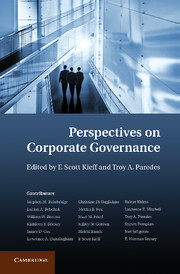Book contents
- Frontmatter
- Contents
- Contributors
- Acknowledgments and Dedication
- PERSPECTIVES ON CORPORATE GOVERNANCE
- Introduction
- PART ONE THE BOARD OF DIRECTORS AND THE CEO
- PART TWO THE WHY, WHEN, HOW, AND HOW MUCH OF EXECUTIVE PAY
- 4 Pay Without Performance: Overview of the Issues
- 5 Supersize Pay, Incentive Compatibility, and the Volatile Shareholder Interest
- 6 “Say on Pay”: Cautionary Notes on the U.K. Experience and the Case for Muddling Through
- PART THREE CONSTRAINING MANAGERS AND DIRECTORS: INVESTORS, SECURITIES REGULATION, AND THE MEDIA
- PART FOUR DELAWARE VERSUS CONGRESS: ON THE FEDERALIZATION OF CORPORATE GOVERNANCE
- PART FIVE COMPARATIVE CORPORATE GOVERNANCE
- Epilogue: Three Secular Trends of Corporate Law
- Index
- References
5 - Supersize Pay, Incentive Compatibility, and the Volatile Shareholder Interest
Published online by Cambridge University Press: 04 August 2010
- Frontmatter
- Contents
- Contributors
- Acknowledgments and Dedication
- PERSPECTIVES ON CORPORATE GOVERNANCE
- Introduction
- PART ONE THE BOARD OF DIRECTORS AND THE CEO
- PART TWO THE WHY, WHEN, HOW, AND HOW MUCH OF EXECUTIVE PAY
- 4 Pay Without Performance: Overview of the Issues
- 5 Supersize Pay, Incentive Compatibility, and the Volatile Shareholder Interest
- 6 “Say on Pay”: Cautionary Notes on the U.K. Experience and the Case for Muddling Through
- PART THREE CONSTRAINING MANAGERS AND DIRECTORS: INVESTORS, SECURITIES REGULATION, AND THE MEDIA
- PART FOUR DELAWARE VERSUS CONGRESS: ON THE FEDERALIZATION OF CORPORATE GOVERNANCE
- PART FIVE COMPARATIVE CORPORATE GOVERNANCE
- Epilogue: Three Secular Trends of Corporate Law
- Index
- References
Summary
The compensation of chief executive officers (CEOs) increased by a factor of six over the past two decades, with the overwhelming share of the increase coming not as salary but as “incentive pay,” mostly in the form of stock options and cash bonuses triggered by performance metrics. Observers from outside the corporate governance arena perceive a social problem and question the magnitude of this raise. They worry about the fact that executives in the United States are by far the world's best paid. On the domestic level, observers also worry about a growing inequality of income: the average CEO of an S&P 500 company made 30 times more than the average American production worker in 1970, but 210 times more in 1996. By 2005, the multiplier was 262.
Inside the world of corporate governance, the question is different, because the level of compensation is not by itself seen as a problem. Tournament economics provides a widely accepted justification for supersize amounts. The tournament sweeps in the entire set of aspiring executives, who then compete for a small number of top-tier jobs. High-powered competition ensues among executives, which is thought to result in better management. The corporate governance question is whether compensation mechanisms within the winner's circle should be subject to exacting standards of incentive compatibility. Critics of prevailing practices argue that large payoffs to managers should be strictly conditioned on the creation of shareholder value.
- Type
- Chapter
- Information
- Perspectives on Corporate Governance , pp. 150 - 188Publisher: Cambridge University PressPrint publication year: 2010
References
- 2
- Cited by



